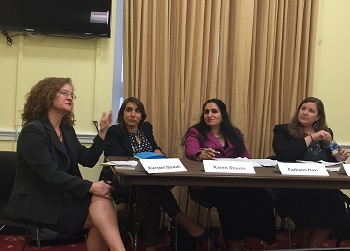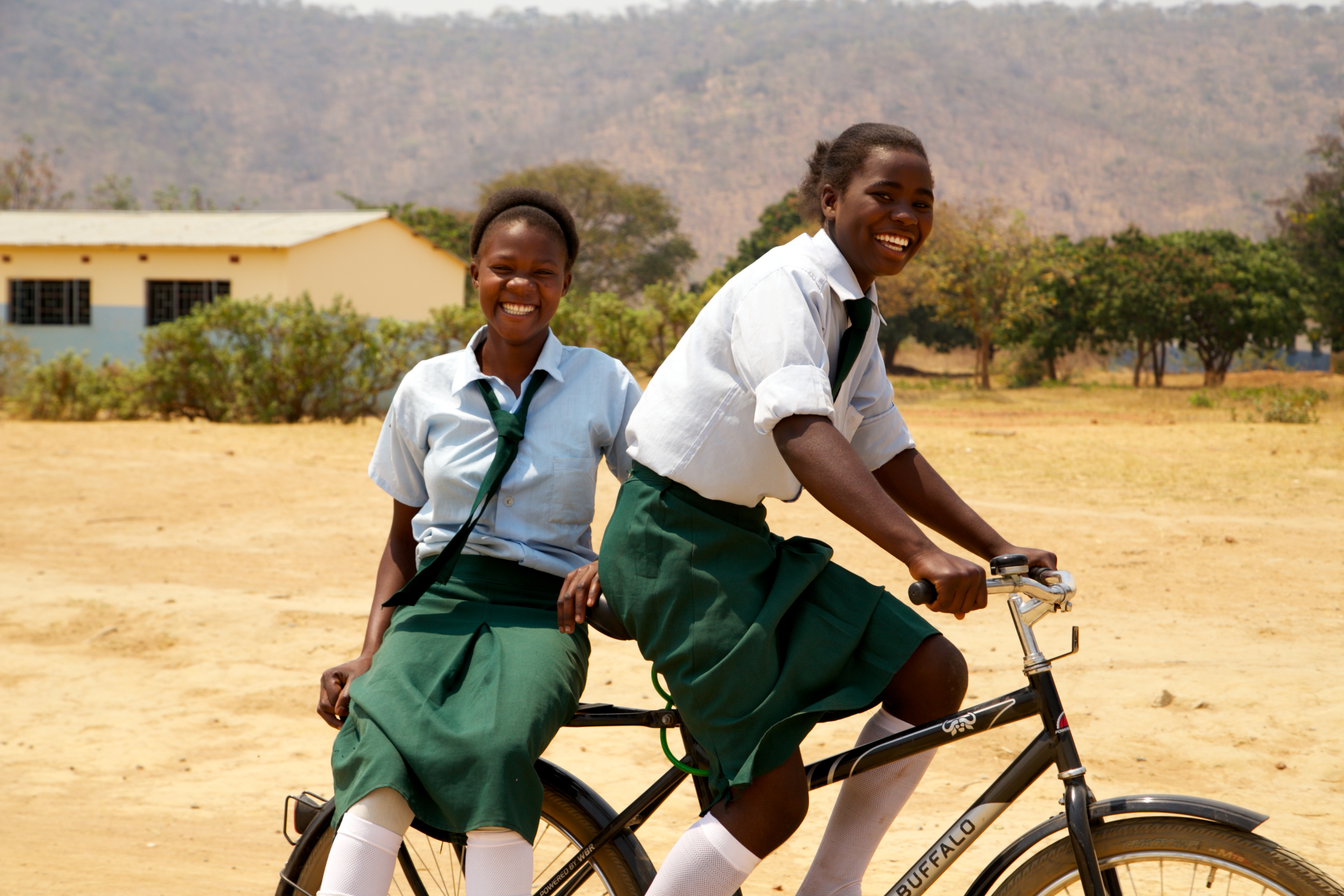FUTURES Hosts Congressional Briefing on Gender-based Violence in Humanitarian Settings

On March 24, 2016, as part of Women’s History Month and in partnership with Congressman Mike Honda (CA-17), FUTURES hosted a briefing on capital hill to shed light on the increased vulnerabilities faced by women and girls in humanitarian settings. Amnesty International USA, CARE USA and Women Thrive Worldwide also served as partners in this event, representing the leadership team of the Gender-Based Violence Coalition.
As the sponsor of this timely program, Congressman Honda shared the following message:
“Gender-based violence (GBV) is a global scourge, and it is imperative that we do more to help the most vulnerable people in our society and across the world. In times of peace and in times of conflict, in every country in every region, gender-based violence exists and flies under the radar. It is scandalous that so few resources are directed towards GBV. GBV must be a priority from the beginning, across all sectors and agencies. Existing guidelines must be respected and actors held accountable if they fail to meet international standards. Combating GBV has long been my
priority. Last year I was proud to co-find the International Parliamentary Coalition for Victims of Sexual Slavery to promote cooperation among parliamentarians in raising domestic and international awareness about modern day slavery. As Ranking Member of the Commerce, Justice and Science Subcommittee, on the House Appropriations Committee, I am proud to fight for the necessary resources to combat GBV, here in our nation and abroad. For instance, for Fiscal Year 2016, I secured $480 million for the Office on Violence against Women, and $45 million for human trafficking victim services. It has been an honor to work with Futures Without Violence and Women Thrive to host this timely, and sadly all too necessary, briefing to raise awareness and discuss potential solutions. Working together, we can eradicate the horror of gender-based violence.”
It’s estimated that 35 percent of women worldwide have experienced physical or sexual violence at some point in their lives. In particular, during times of conflict or natural disaster, women and children are disproportionately vulnerable to violence and abuse from both within their family and outside actors. Internally, the volatility of a family setting is increased by displacement, stress, changing roles, and new challenges; externally, opportunistic predators and a lack of safe infrastructure facilitate the creation of a hunting ground for violent extremists and human traffickers. These complex issues need careful examination and consideration of potential solutions.
 The March 24th event provided an opportunity to identify the drivers of the increased vulnerabilities and outline possible solutions to decreasing and addressing these vulnerabilities. Janine Kossen, Senior Policy and Advocacy Officer at International Rescue Committee opened the program by sharing some very sobering and compelling facts, maintaining that “in fragile and conflict-affected states, violence is one of the most significant threats to women’s safety and wellbeing,” and that during war and natural disasters, “women are far more likely than men to die, face increased risk of violence, not receive necessary health care, and experience ongoing economic vulnerability.” Speaking to the congressional staffers and policy advocates present in the audience, Kossen proposed series of solutions and recommendations which included the need for increased funding dedicated to GBV, prioritization of specialized and mainstreamed GBV programming, and support for Call to Action on Protection from GBV in Emergencies, Safe from the Start, International Violence Against Women Act, USG strategies, National Action Plan on Women Peace and Security, and engagement of women and girls directly.
The March 24th event provided an opportunity to identify the drivers of the increased vulnerabilities and outline possible solutions to decreasing and addressing these vulnerabilities. Janine Kossen, Senior Policy and Advocacy Officer at International Rescue Committee opened the program by sharing some very sobering and compelling facts, maintaining that “in fragile and conflict-affected states, violence is one of the most significant threats to women’s safety and wellbeing,” and that during war and natural disasters, “women are far more likely than men to die, face increased risk of violence, not receive necessary health care, and experience ongoing economic vulnerability.” Speaking to the congressional staffers and policy advocates present in the audience, Kossen proposed series of solutions and recommendations which included the need for increased funding dedicated to GBV, prioritization of specialized and mainstreamed GBV programming, and support for Call to Action on Protection from GBV in Emergencies, Safe from the Start, International Violence Against Women Act, USG strategies, National Action Plan on Women Peace and Security, and engagement of women and girls directly.
Recommendations for preventing gender-based violence in humanitarian settings:
- Community-based facilitation of access to state-provided social protection schemes for earthquake-affected populations enhances actual access and resilience.
- Quickly reviving and strengthening local mechanisms such as village child protection committees and enabling these committees to take collective actions has positive outcomes.
- It is vital to integrate protection activities across all of the cluster activities (e.g. water, shelter, education, etc.) in order to detect problems and intervene. All cluster interventions should use a protection checklist.
Farhana Qazi, a counter-terrorism expert and researcher on women in conflict, and the author of Secrets of the Kashmir Valley, spoke about how extremist groups use conflict settings or humanitarian crises as potential recruiting grounds for women to join their movement and engage in violent crusades. She highlighted the limited understanding of how and why women and girls may want to join such movements and where our policies have failed to recognize the signs and drivers for their recruitment.
Finally, Karen Stauss, Director of Programs for Free the Slaves, shared the latest joint report and publication entitled Understanding Vulnerabilities and Strengthening Response: Community-based Integration of Anti-trafficking and Human Rights Protections within Post-Earthquake Recovery Efforts. The study found that post earthquake conditions posed unique threats to the survivors in communities and maintained that the erosion of social networks and lack of public assistance made children, women and marginalized groups even more at risk. The report raised the growing concern that thousands who lost their homes and assets have become targets of human traffickers. Additionally, it was observed that earthquake survivors faced higher threats of physical abuse, exploitation and sexual violence. Inadequate relief supplies, unsafe shelters, uncertain futures, delayed processing of government recovery assistance and the lack of information on relief services were all contributing factors to the increased vulnerabilities. The report determined that resulting desperation and unrestricted access to the affected populations offered an opportunity for organized traffickers. Stauss highlighted a few of the recommendations informed by the research and learnings in the field.
Kiersten Stewart, Director of Public Policy and Advocacy at Futures Without Violence, moderated the event and highlighted the importance of first identifying the drivers of these vulnerabilities and second developing sustainable and holistic strategies which both address the root causes of the vulnerabilities and effectively respond and put in place structures and programs that serve to inoculate the survivors of these conflicts and natural disasters from further abuse and violence. The compelling and overarching message from the briefing was the unified and constant call for humanitarian actors/sectors to see GBV as part of their mandate and the need for increased resources.





